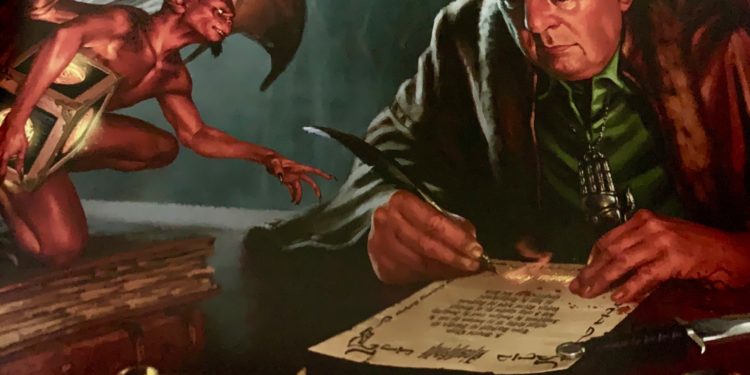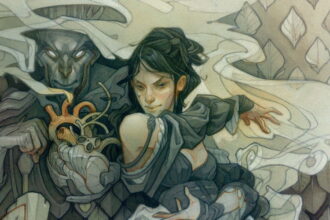A Guide to Roleplaying Humans

Humans are defined by their ambition more than other races in Dungeons & Dragons 5e. Humans are one of the shortest-lived races compared to the other common races. Where an elf or dwarf might see it their life’s work to establish a city, or to civilize a wild country, humans rely on creating organizations, legends, and culture to do so. This creates interesting story hooks to develop your human’s connection to the world.
For more guides to roleplay your favorite race, check them out here: elf, half-elf, half-orc, lizardfolk. A new guide published each week.
Ambition & Legacy, Institutions & Causes
The Player’s Handbook gives the following major traits to humans in Dungeons and Dragons.
- Humans are diverse and vibrant. They have a wide variety of customs, moral frameworks, and ambitions.
- Human adventurers are ambitious people. Humans become adventurers because they want to achieve something great with their lives. Humans, perhaps more than other races, choose the life of adventure. The PHB calls them “adaptable opportunists”.
- Humans desire to be remembered, and so they develop institutions to pass on their legacy. What legacy is your human wanting to be remembered for? And, what legacy are they a part of?
Playing a human gives you a wide pallet to paint with. Your character’s motivation and backstory can be as wild or as mundane as you desire. What defines your human is their “why”. Understand that and you can use that as the foundation on which to build and grow your character through play.
Variety is the Spice of Life
Embrace the vast variety that is humanity! Create a character whose origins are very different from your own, or with an outlook that you’ve always wanted to explore, or a profession that you’ve always had an interest in. This can be a fertile place for the development of your character’s backstory.
The culture in which the human is raised is a defining part of their outlook on the world. This is a great place to world build. Work with your DM to see what human cultures in-game match what your character idea is for your human. Here’s a quick way to develop a human culture:
- Establish the geography of where the culture originates. Geography influences culture by giving it constraints. A culture bounded by deserts is very distinct from one located on a wetland, or entirely at sea. Perhaps there is a society whose primary trade is maritime trading. How could this influence how your character sees the world? Maybe the harsh nature of the sea is reflected in their cultural outlook: Life is meant to be lived as vibrant as possible because it is short and you never know when you’ll die, or for those desert dwellers, maybe you never turn anyone away who asks for food and shelter because of cultural norms around hospitality. Develop a few cultural norms that your character embraces.
- What institutions are present in the community? Is there an association of bankers, or a long-established nobility? Maybe there is a college of wizards that shape and give meaning to the culture’s existence. Institutions are reflections of a culture’s moral norms and reinforce it. These institutions don’t have to be brick-and-mortar types either. They could be entirely oral transmissions, with ancient knowledge being passed down mother to child.
- What moral truisms are instilled in your character? Self-sufficiency, independence, community, deference to elders, saving face, these are all cultural mores that you can use to help give your character a distinct personality when roleplaying. Think of them as shortcuts to believable character behavior. What does your character hold to be true and valuable?
One thing to note when creating a unique culture for your human character is to try to avoid directly copying a real-world culture. While you can certainly take inspiration from real-world cultures, lifting pieces wholesale from a real culture is disrespectful and problematic. A good general rule when it comes to taking from real cultures is: If you have to ask, you probably shouldn’t.
The world of Dungeons and Dragons is a pastiche of tropes and settings from popular fantasy. Allow this mix to inspire you to create something unique for your human.
Essential parts of playing a Human
Humans are very diverse and can fit into any sort of character archetype you are looking to play. From dread necromancers to noble warriors, to code-abiding thieves, humans can easily be any one of these.
Playing a human also gives you the player an advantage of, well, being a human yourself. Use your emotional compass to sense how your character would react. While it is fun to essentially make yourself in a high fantasy setting, try out a different gender, or age and see what unique role-play experiences come from that.
The traits for humans listed in Player’s Handbook also present a lot of threads that can be woven into an interesting character.
The increase to your ability scores can be an indicator of a well-rounded education, or a life full of odd-jobs. The variant human rules could show a certain amount of specialization, especially with the extra skill gain.
The extra feat offered by the variant is a great place to start to fill out your character. Incorporate into your backstory how you came to be skilled in the feat. Let the feat inform your character’s backstory to add another layer of depth to them.
For example, if you took the magic initiate feat, why did you stop your training?
You can also take advantage of what the extra language could mean. If your human speaks Dwarvish, how did they come about learning that language? Were they raised in a town that traded with a nearby dwarven stronghold? Maybe they were adopted by dwarves and raised as one. Or, perhaps they learned how to woo a dwarf?
Questions to help fill your human’s backstory
Here are some questions to help you create a great backstory for your human character:
- What drives your character? What do they want to have, accomplish, or do most in life?
- What cultural legacies do they owe their allegiance to? Who do they respect? Who do they disrespect? How did they come to feel that way?
- Why do they choose a life of adventure? How does being an adventurer help them get closer to their goals?
- What values and social mores did they inherit through their native culture? How does this shape how they interact with the different sexes? With people of different ages? Do they show deference and respect to a certain demographic because of the culture they were raised in?
- What did your character do to gain the skills they have as an adventurer? What brought them to where they are at the beginning of the campaign?
For more guides to roleplay your favorite race in Dungeons & Dragons 5e check them out here: elf, half-elf, half-orc, lizardfolk. A new guide published each week. Comment with your favorite race and it might be featured!


